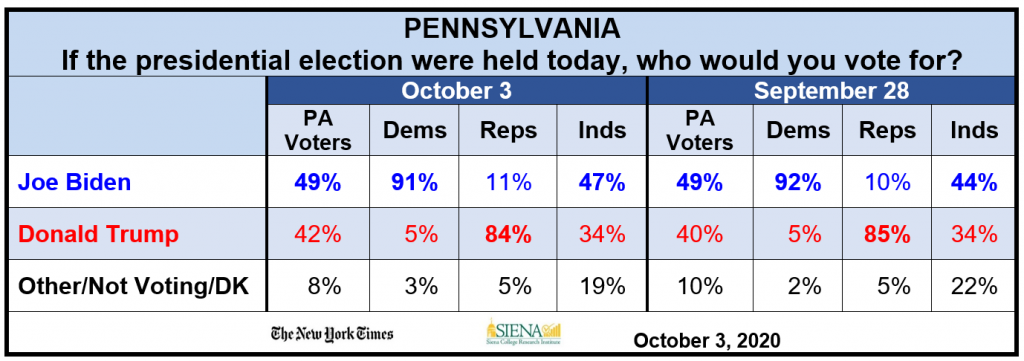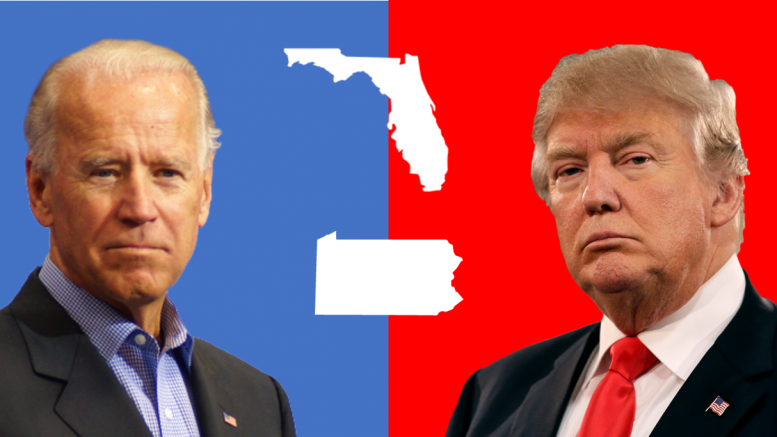- Florida: Biden 47% – Trump 42%
- Pennsylvania: Biden 49% – Trump 42%, From: Biden 49% – Trump 40%, September 28th
- More Voters in Each State Say Biden Won the Debate Over Trump
- Small Majority in Each Views Biden Favorably & Trump Unfavorably
Loudonville, NY. In the aftermath of the first presidential debate, former Vice President Joe Biden leads President Donald Trump in two key battleground states. In Florida, Biden leads 47-42 percent, and he leads 49-42 percent in Pennsylvania, little changed from 49-40 percent on September 28, according to The New York Times/Siena College polls of likely Florida and Pennsylvania voters released today.

“In the key battleground state of Florida, which Trump carried by a little over a percentage point in 2016, Biden holds a five-point lead coming out of the first debate. Biden has the support of 93 percent of Democrats and leads Trump by 12 points with independents, while Trump is supported by 87 percent of Republicans,” said Don Levy, Director of the Siena College Research Institute.
“While Trump wins among white voters, 52-38 percent, Biden has a commanding 75-5 percent lead with Black voters and leads among Latino voters, 58-34 percent,” Levy said. “Men are with Trump by five points, while women are with Biden by 14 points. Older Floridan voters are closely divided.” Biden has a 52-44 percent favorability rating. Trump has a negative 44-53 percent favorability rating and a negative 45-52 percent job approval rating.
“By a small margin, voters have a favorable view of Biden, and by a small margin, have an unfavorable view of Trump,” Levy said. “While 51 percent of voters say Biden is honest and trustworthy, 60 percent say Trump is not. Voters are nearly evenly divided on whether or not Trump is a strong leader, and they’re divided on Biden as well. Voters are also closely divided on each candidate’s mental sharpness to be an effective president.”
Eighty percent of Floridians say they watched the first debate on Tuesday. By a 39-24 percent margin, voters say Biden won the debate over Trump. Voters disapprove of the way Trump conducted himself during the debate 64-28 percent, and they approve of the way Biden conducted himself 51-39 percent.
“Not surprisingly, Democrats think Biden won the debate 75-3 percent, however, Republicans thought Trump won but only by a 52-11 percent margin. Independents sided with Biden 36-16 percent. Even a core group of Trump supporters – whites without a college degree – were closely divided on the debate winner,” Levy said. “Only 27 percent said the debate made them more likely to support Trump; it made 48 percent less likely. Biden’s performance made 37 percent more likely to support him and 32 percent less likely.
“The Sunshine State – which has voted for three Republicans and three Democrats in the last six elections – is likely to once again have the light shining its way on election night as both candidates battle for Florida’s important 29 Electoral College votes,” Levy said. “While Biden currently has a small lead, there is still a month to go and millions of dollars of television, radio and social media ads still to be aired. We’ll be keeping an eye on this one.”

“While it seems like only yesterday we were reporting on Pennsylvania – alright it was five days ago – in between we had the debate, as well as the release of The New York Times reporting on Trump’s taxes. What’s the reaction of Pennsylvania voters to those events? Apparently very little,” Levy said. “Biden’s nine-point lead, 49-40 percent, is now a seven-point lead, 49-42 percent. Biden’s favorability rating fell a little but is still positive. Trump’s favorability rating didn’t move a point and is still negative.”
Eighty percent of Pennsylvania voters say they watched the first debate. By a 35-18 percent margin, voters say Biden won the debate over Trump. Voters disapprove of the way Trump conducted himself during the debate 68-22 percent, and they approve of the way Biden conducted himself 52-35 percent.
“While nearly twice as many voters think Biden won the debate compared to Trump, nearly half didn’t choose either as a winner. Nearly two-thirds of Democrats said Biden won the debate, however a majority of Republicans could not choose a winner and only 37 percent said Trump won,” Levy said. “Nearly half of voters say his debate performance makes them less likely to support Trump, compared to 19 percent who say it makes them more likely. For Biden, it’s 35 percent more likely and 29 percent less likely.
“Pennsylvanians continue to think Biden is more honest and trustworthy. They continue to be closely divided on whether either Trump or Biden is a strong leader and on whether either Biden or Trump has the mental sharpness to be effective. And they continue to give Biden better grades than Trump on unifying the country, having good policies, and the right personality and temperament to be president,” Levy said.
“As Trump looks to hold onto Pennsylvania’s 20 Electoral College votes, and Biden looks to move them back into the Democratic column, Pennsylvanians are likely to see a lot of effort from both campaigns and frequent visits by the candidates,” Levy said. “Voters didn’t move very much in the last week, so it will be interesting to see if the race here continues to be stable or if events will shake up the race and tighten it or lead to an even larger Biden lead. Stay tuned.”
This New York Times/Siena College survey of Florida was conducted September 30-October 1, 2020 by telephone calls in English and Spanish to 710 likely voters, with a margin of error of +/- 4.2 percentage points. This New York Times/Siena College survey of Pennsylvania was conducted September 30-October 2, 2020 by telephone calls in English to 706 likely voters, with a margin of error of +/- 4.1 percentage points. Calls were made to a stratified weighted sample of voters from the L-2 Voter list via both land and cell phones. The data was weighted by party, age, race/ethnicity, education, region, gender and voter likelihood, a computed score that combines voter history, stated voter likelihood and modeled turnout by respondent. Polling support for this project provided by Institute for Policy and Opinion Research at Roanoke College, M. Davis and Co., Reconnaissance Market Research, and The Public Opinion Research Lab at the University of North Florida. The Siena College Research Institute, directed by Donald Levy, Ph.D., conducts political, economic, social, and cultural research. SCRI, an independent, non-partisan research institute, subscribes to the American Association of Public Opinion Research Code of Professional Ethics and Practices. For more information, please call Don Levy at 518-944-0482. Survey cross-tabulations and frequencies can be found at: www.Siena.edu/SCRI/SNY. For additional methodological information, click here.





